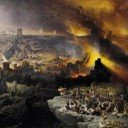As we come to final few posts of this current discussion of theme and characters that make up the popular eschatological landscape we will take a look at the famous “Battle of Armageddon.” This event may be the single most popular event is Scriptural eschatology in the mainstream world. Familiarity with the term is world wide. Movies have been named after this event and the term is used commonly to describe horrific events, especially those related to war.
Armageddon to most most people probably conjured up images of the end of the world. In the popular Bruce Willis movie sharing the same name, a group of oil workers are sent up on the Space Shuttle to blow up an enormous meteor heading toward earth. The term rings true in the ears of the movie goer because he associates the term with utter destruction and the end of the world.
But where Biblically does the concept come from and what should we make of it in light of all of our previous discussion?
Before diving headlong into such a difficult subject it’s important that we, once again, eliminate the false and erroneous views from our minds. This will prove increasingly difficult because of the great debate as to where the Battle of Armageddon lands in the eschatological time line. Below are a few highlights that will either clear up the situation or prove just why this section will be difficult.
- Some argue this event is the initial event tha takes place to start the Great Seven Year Tribulation. It’s beginning will coincide with the Rapture of the Church
- Others state it is the final battle of the Great Tribulation era where Jesus rescues Israel from all the nations of the Earth with His actual, physical Second Coming
- Finally others argue it is the great battle at the end of the Millennium found in middle of Revelation 20
- Most will argue this is the same battle described in Ezekiel 38 and 39
So, did that clear things up for the reader?
Well, as been our tradition here, we will look at where the Scriptures mention the term and how it is used. This will actually prove to be quite easy - sort of. The easy part is that the term is found only once in the entire Bible at that is is Revelation chapter 16.
Rev 16:14 For they are demonic spirits, performing signs, who go abroad to the kings of the whole world to assemble them for battle on the great day of God the Almighty. 15(”Behold, I am coming like a thief! Blessed is the one who stays awake, keeping his garments on, that he may not go about naked and be seen exposed!”) 16And they assembled them at the place that in Hebrew is called Armageddon.
The difficulty? Well one problem is that many reliable manuscripts and translations use the term Har-mageddon. The fist denotes the” town” of Megiddo while the later refers to the hill or mountain of Megiddo. There is difficulty with both in that Megiddo was a “land” or nation and also a very large plain. It is not definitive whether the land in question was a city and the plain of Megiddo has no hill or mountain adjacent to it. The closest mountain would be Mt. Carmel
What adds to the difficulty is the fact that the one time the phrase is used in the entire Bible it is in the midst of the very difficult and symbolic passage in the Bible’s most difficult and symbolic book. And that is the only usage of this actual term though Megiddo is used over 10 times in the rest of Scripture. Most of those indicate from where a particular king came from or it references a place of battle as in the plain of Megiddo.
The additional difficulty lies in the continued comparison with the battle described in Ezekiel 38 and 39 which feature Gog and Magog. But in Revelation Gog and Magog appear at the battle near the end of chapter 20! And Bible prophecy “experts” wonder why so many throw up their hands in defeat and just move on to read drivel like The Shack.”
This confusion has lead to some great misunderstanding about the way the terms Gog and Magog are used, how the Battle of Armageddon fits into any particular view and how best the student should consider these passages. For the sake of our discussion we will start with the term Armageddon and how it used in Revelation in relation to the rest of Scripture and follow up with the popular Ezekiel passages and relate them to the similarities in Revelation.





No comments:
Post a Comment